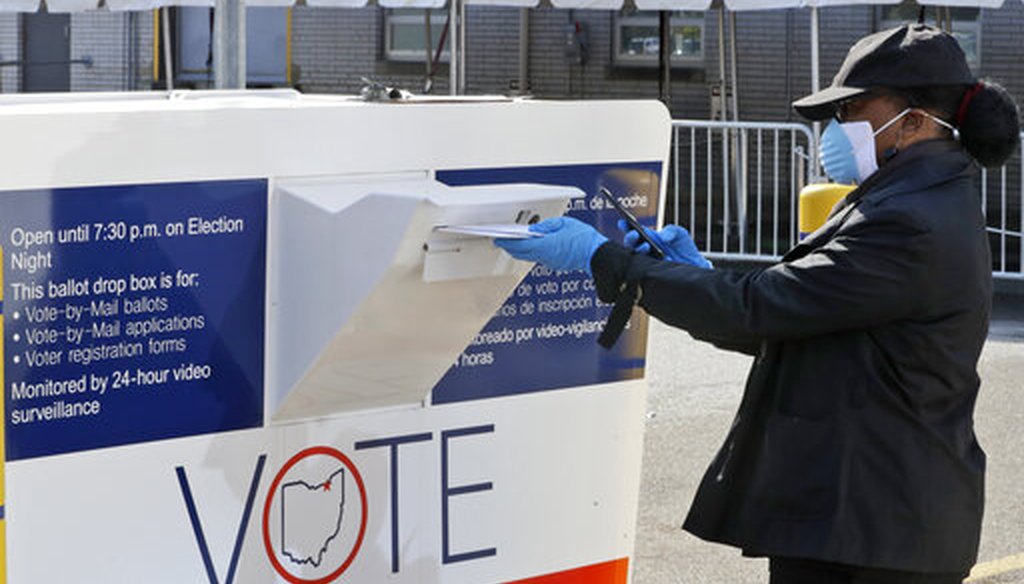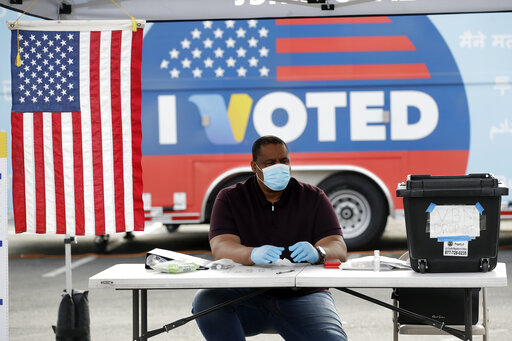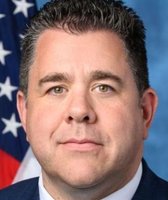Stand up for the facts!
Our only agenda is to publish the truth so you can be an informed participant in democracy.
We need your help.
I would like to contribute

Marcia McCoy drops her ballot into a box outside the Cuyahoga County Board of Elections on April 28, 2020, in Cleveland, Ohio. (AP)
If Your Time is short
• Local elections officials expect a significant increase in voting by mail this fall. To prepare, they’re buying more ballots and trying to hire more workers to count them. But they are worried about the logistical challenges and running out of money.
• Some states have already begun to change their rules to encourage mail balloting, but others are taking a wait-and-see approach.
• Keeping in-person polling sites accessible and safe presents another challenge, and some supervisors are uncertain about how many sanitizing supplies they will need.
About half of voters in Lee County, Fla., decided to cast their votes by mail in the past two statewide elections. Elections supervisor Tommy Doyle expects that to climb to 70% in November due to concerns about the COVID-19 pandemic.
Doyle, a Republican in a conservative-leaning county, home to Fort Myers, has encouraged voters to mail their ballots this year out of concern for their safety. He is sending information about voting by mail, with a postage-paid return envelope, to every address in the county. For voters who had already requested a ballot, he is sending a card to confirm that their address remains current.
At the same time, Doyle is doing his best now to ensure that Election Day is safe for people who want or need to cast their ballots in person.
"We are now getting quotes to install sneeze guards at all our offices that take in the public and extra face masks and everything we need for sanitation at polls," he said.
With the 2020 presidential election less than six months away, state and local officials are scrambling to prepare for a potentially massive increase in voting by mail.
Sign up for PolitiFact texts
In 2016, about one-quarter of votes nationally were cast by mail through absentee voting. This year, some state governments have already changed laws and policies to expand it.
Virginia and New Hampshire no longer require an excuse to cast an absentee vote (setting them apart from 15 states that still do). In California, Gov. Gavin Newsom ordered a ballot sent to every voter. A bill to ease mail balloting in Missouri is now at the governor’s desk. And New York, Kentucky, Louisiana, and South Carolina have made the vote-by-mail process easier for their respective primaries, though not yet for the general election.
The nitty-gritty of administering the 2020 vote, however, is left to local officials like Doyle who are making their best guesses about how to prepare.
To size up how ready the country is for a pandemic election, PolitiFact interviewed state and local officials in six states frequently cited by political handicappers as the most competitive tossups in the country: Arizona, Florida, Michigan, North Carolina, Pennsylvania, and Wisconsin.
Election officials described multiple challenges with managing an expansion of mail-in ballots — even in places where it is already common — while keeping in-person voting open and safe.
Of the six, Arizona is the only one where mail balloting is the dominant form of voting. In Phoenix-based Maricopa County, almost 74% of the county’s 2.4 million registered voters are on the permanent list for mail-in ballots.
Florida and Michigan see moderately high use of mail-in voting. Michigan’s March 2020 presidential primary, held in the pandemic’s early days, saw increases in absentee voting of 60% to 80% in many jurisdictions, according to the Michigan Association of Municipal Clerks. Some even saw increases of greater than 100%.
But in Wisconsin, North Carolina, and Pennsylvania, mail ballots historically account for only single-digit shares of the votes cast. That’s not likely to be the case this fall.
Ahead of its June 2 primary, populous Allegheny County, Pa., which includes Pittsburgh, moved to reduce in-person voting and encourage mail balloting. And officials in Bucks County, Pa., near Philadelphia told PolitiFact they have also seen a substantial increase in absentee ballot requests for the primary.
Wisconsin’s chaotic April 7 election showed many officials what they want to avoid: multiple lawsuits, missing absentee ballots, and a shortage of poll workers that led to many election sites closing, prompting long lines at the remaining sites.
Wisconsin is one of many states where the vast majority of voters normally cast ballots in person rather than by mail. But on April 7, that pattern flipped.
For example, in the city of Oconomowoc, in historically Republican Waukesha County near Milwaukee, 85% voted by absentee and 15% in person. That’s essentially the opposite of four years ago, city clerk Diane Coenen said, and will be used as a guide for the August primary.
In interviews with PolitiFact, local officials described what they’re working on and what they’re worried about ahead of the election. Complicating matters, however, is that there is only so much within their control. State governments may pass new laws and judges may issue rulings, while the U.S. Postal Service needs to navigate a difficult fiscal situation if it is to deliver the flood of new mail ballots.
A voter wearing a protective mask in Dunwoody, Ga., on May 18, 2020. (AP)
Equipment and supplies. The list of needed equipment includes specialized machines and humble supplies like envelopes and postage.
In Bucks County, Pa., the county commission recently doubled its order of high-speed scanners to handle incoming mail, and it retained a mail-handling company to help with the job of running a more mail-dependent election.
For its remaining in-person voting sites, Bucks County has been shelling out for facemasks, disinfecting wipes and the like, using both state and federal money. This comes on top of a shift to voter-verified paper balloting machines that were mandated before the pandemic and are now undergoing their first serious test in an election.
In Florida’s Palm Beach County, a challenging item has been hand sanitizer. Officials are also working to secure portable plexiglass partitions for poll workers.
Counting the ballots. For jurisdictions that are used to handling small amounts of mail ballots, the increase expected for the fall is going to require additional manpower.
Michigan election officials want lawmakers to pass a bill that would allow groups of communities within the same county to form a single absentee-voter counting board to process and tabulate mailed ballots on Election Day. They say this would help local clerks process ballots more efficiently. Another bill would allow for "pre-processing" of absentee ballots, short of opening the vote itself, to speed the process of tabulation on Election Night.
Lawsuits over ballot procedures are already happening. In Pennsylvania, plaintiffs are asking a state court to require the state to count ballots that are postmarked by Election Day, not just those received by Election Day. The plaintiffs are concerned that delays in processing mail ballot requests could effectively disenfranchise voters through no fault of their own.
In Wake County, N.C., officials typically review every absentee ballot envelope to make sure it has the voter’s signature and a witness. Based on the projected increase in absentee ballots, board member Gerry Cohen estimated that the elections board would need to meet five days a week, 10 hours a day, for 21 days to get it all done.
Problems at in-person voting sites. The reality is that some people, whether out of need or habit, will want to vote in person, and the locations will need to be roomy enough for social distancing.
Palm Beach County, Fla., officials are grappling with the reality that some voting sites are on privately owned property, such as churches, temples and assisted living facilities. Some of these sites may not be available due to the pandemic.
Election worker Kevin Myvette wears a mask while assisting voters during a special election for California's 25th Congressional District seat on May 12, 2020. (AP)
Shortages of poll workers. About 60% of poll workers across the country are age 61 or older, according to the Pew Research Center. That puts many of them squarely in a higher-risk group for coronavirus.
In Greene County, N.C., most poll workers are retired. Trey Cash, the county’s elections director, said one of his fears is that during early voting, someone will come in with a simple cold, creating rumors that lead poll workers to decide not to take the risk of working.
"We are trying to reach out to a younger population to serve as poll workers," while also retaining those who have worked in the past, he said.
In Michigan, election officials have launched a recruitment effort that attracted at least 1,800 individuals within its first few weeks. College-age residents could be a target population for replenishing the ranks of election volunteers, officials said.
Partisan and state government paralysis. Wisconsin, with a Democratic governor and Republican Legislature, isn’t the only battleground state where partisan officials have been at war. Michigan, North Carolina, and Pennsylvania also have a Democratic governor and a Republican legislature, and the health and economic strains of the pandemic have made it difficult for lawmakers to come together and enact changes in election law.
In North Carolina, where officials say they expect voting by mail to explode from its typical level of 4% of ballots cast to as much as 40%, the state board of elections recommended that the legislature should expand access by allowing a voter to submit an absentee ballot request form by fax or email, provide pre-paid postage, and reduce or eliminate the witness requirement. But the Assembly has not yet adopted these recommendations.
In Florida, the statewide association of election supervisors asked Gov. Ron DeSantis on April 7 to alter state election procedures to give them more flexibility to operate elections, including adding early voting days, leaving early voting sites open on Election Day, and expanding the time to send out absentee ballots. Those changes would help supervisors who face an anticipated shortage of workers to cover as many as hundreds of election day precincts.
Six weeks after the request, the state had not yet acted, despite another plea from the association.
If DeSantis grants the association’s request, Doyle, Lee County’s supervisor of elections, said he would eliminate precinct voting and add early voting sites that could accommodate voters for two weeks. He would also need to train only 500 workers, rather than 2,000.
Misinformation. In Arizona, and likely other states, misinformation about procedures and timelines for voting remains the main challenge. Election officials fear that anonymous bad actors will try to send voters to the wrong location or suggest voting on the wrong day.
The Arizona Secretary of State’s office is working with its national association to make sure voters go directly to election officials’ websites and verified social media pages throughout the election cycle, rather than ones of questionable veracity. The office is seeking to provide accessible election information in English, Spanish, and Navajo, said office spokeswoman Sophia Solis.
Cost. The $2.2 trillion CARES Act passed by Congress in March earmarked $400 million in emergency assistance for voting. That money is already starting to trickle down to election officials across the country. Some states are providing money on top of that.
Whether it will be enough remains to be seen.
In May, the Florida election supervisors urged DeSantis to join nearly every other state in accepting federal CARES Act money to help pay for election costs, including personal protective equipment for poll workers. Florida officials announced that it would accept the $20 million in federal money and work with the Legislature to find a $4 million state match.
In Maricopa County, Ariz., officials say they will likely need additional federal funding to support the coronavirus response.
If Michigan conducted the August primary and November general election the same way it did the March presidential primary, plus additional resources such as high-speed tabulator machines, "we are estimating a need of about $40 million from the federal government," Wimmer said. By comparison, the state has received $11.2 million from the CARES Act for election costs.
"We’re operating under reality as opposed to hope," said Gail Humphrey, chief clerk in Bucks County, Pa. "But it’s completely uncharted territory."
Our Sources
PolitiFact, Will COVID-19 force a massive absentee vote in November election? March 24, 2020
New York Times, Democrats’ Vote-by-Mail Effort Won in Wisconsin: Will It Work Elsewhere? May 10, 2020
CAP Radio, All Californians Will Get Mail-In Ballots For November Election, May 8, 2020
Represent us, A state-by-state breakdown of vote by mail, Accessed May 14, 2020
Philadelphia Inquirer, "The legal team that overturned Pa. gerrymandering is suing to relax the state’s absentee ballot deadlines amid the coronavirus outbreak," April 27, 2020
Cook Political Report, "Just What Will Voting Look Like This Fall?" April 22, 2020
NBC News, "Coronavirus could cripple voting in November. But it depends where you live," April 17, 2020
St. Louis Post-Dispatch, "Missouri moving to allow mail-in voting during pandemic," May 13, 2020
CNN, "Louisiana voters can now request absentee ballots by citing coronavirus concerns," May 8, 2020
Greenville News, "No-excuse absentee voting approved in South Carolina as coronavirus concerns continue," May 12, 2020
Vox.com, "New York and Kentucky just made it easier to vote by mail," April 25, 2020
PublicSource, "The push for mail-in voting for the June 2 primary underscores challenges for the upcoming election," April 24, 2020
Austin American-Statements, Legal fight: Is vote by mail a coronavirus option in Texas? May 8, 2020
Milwaukee Journal Sentinel, 'They should have done something': Broad failures fueled Wisconsin's absentee ballot crisis, investigation shows, April 21, 2020
North Carolina Board of Elections, Recommendations about the 2020 election, April 22, 2020
News and Observer, Lawsuit demands easier vote-by-mail process in NC, May 4, 2020
Miami Herald, Florida supervisors urge DeSantis to ‘act immediately’ to accept federal election funds, May 14, 2020
Florida Supervisors of Elections, Letter to Gov. Ron DeSantis (posted by Miami Herald), April 7, 2020
Sun Sentinel, Florida election supervisors make urgent plea for help to make 2020 voting safe, May 13, 2020
Washington Post, Postal Service to review package delivery fees as Trump influence grows, May 14, 2020
AP, House rescue package includes $25 billion for Postal Service, May 14, 2020
Interview with Tommy Doyle, Lee County Supervisor of Elections, May 12, 2020
Email interview with Craig Latimer, Hillsborough Co. (Florida) supervisor of elections and president of Florida Supervisors of Elections, May 11, 2020
Email interview with Steve Vancore, Broward Supervisor of Elections spokesman, May 11, 2020
Email interview with Suzy Trutie, Miami-Dade Supervisor of Elections spokeswoman, May 8, 2020
Email interview with Wendy Sartory Link, Palm Beach Supervisor of Elections, May 8, 2020
Email interview with, Mark Ard, Florida Division of Elections spokesman, May 14, 2020
Email interview with Tracy Wimmer, director of media relations with the Michigan secretary of state’s office, May 7, 2020
Email interview with William T. Zaagman, lobbyist for the Michigan Association of Municipal Clerks, May 11, 2020
Email interview with Mary Clark, clerk of Delta Township, Mich., and legislative committee chair for the Michigan Association of Municipal Clerks, May 11, 2020
Email interview with Jeremy Howard, Mount Pleasant, Mich., city clerk and president of the Michigan Association of Municipal Clerks, May 11, 2020
Interview with Cindy Dodge, member information services liaison with the Michigan Townships Association, May 5, 2020
Email interview with Sophia Solis, public information officer with the Arizona secretary of state’s office, May 4, 2020
Email interview with Megan Gilbertson, communications with the Maricopa Co., Ariz., elections department, May 5, 2020
Email interview with Wanda Murren, director of the office of communications and press with the Pennsylvania Department of State, May 4, 2020
Interview with Gail Humphrey, Bucks Co., Pa., chief clerk, May 5, 2020
Interview with Tom Freitag, director of the Bucks Co., Pa., board of elections, May 5, 2020
Telephone interview, Diane Coenen, president of the Wisconsin Municipal Clerks Association and city clerk for Oconomowoc, May 1, 2020
Telephone interview, Reid Magney, Wisconsin Elections Commission spokesman, April 29, 2020
Telephone interview, Kristi King, Appleton Wisconsin elections specialist, April 29, 2020
Telephone interview, Patrick Gannon, North Carolina State Board of Elections spokesman, April 29, 2020
Telephone interview, Gerry Cohen, Wake County elections board, April 29, 2020
Telephone interview, Trey Cash, director of elections in Greene County, N.C, April 29, 2020
Telephone interview, Gary Sims, director of the Wake County Board of Elections, April 29, 2020
Telephone interview, Gerry Cohen, board member of Wake County elections board, April 29, 2020
Interview with Edward Foley, law professor at Ohio State University, May 5, 2020
























































